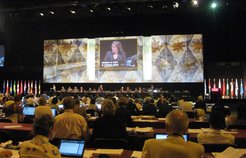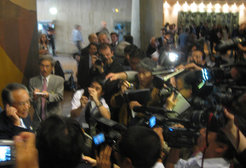Die globale politische Ökonomie des Kulturerbes
UNESCO World Heritage as a Transnational Arena
Researchers:
Christoph Brumann
Forschungsgruppenleiter

As the flagship activity of the United Nations Educational, Scientific and Cultural Organization (UNESCO), the "Convention Concerning the Protection of the World Cultural and Natural Heritage" of 1972 has been ratified by almost all states, and more than 900 sites in more than 150 countries have been inscribed on the prestigious World Heritage List whose rise in public consciousness has exceeded all expectations. World Heritage strongly influences conservation policies as also lay conceptions of culture the world over, yet at the same time, the inner workings of the World Heritage system remain relatively opaque to outside observers. Christoph Brumann has therefore embarked on a multi-sited ethnographic study in which since 2008, he combines participant observation at World Heritage Committee sessions and other official meetings, interviews with key actors such as Committee and state delegates or the personnel of the convention secretariat and advisory NGOs, and a critical reading of the vast number of documents most of which are available on the internet.
One key focus is on the gradual change and "anthropologisation" of World Heritage which has moved from an initial emphasis on monumental and elite sites – palaces and pyramids, cathedrals and historic town centres – to a preference for everyday life (vernacular architecture, industrial sites, modern heritage), connections (routes, canals, bridges, railway lines, migration), cultural landscapes (everything from wine regions to sacred forests), human-rights symbols (Hiroshima, Robben Island, the reconstructed bridge of Mostar, the Bamiyan Valley, sites connected with slavery), and intangible aspects. All of this has significantly broadened the scope of heritage, also within the national states, thus refuting popular views of globalisation as the one-sided dissemination of Euroamerican standards. A second focus is on the tension between the universalist ideals of the convention and the self-interests of the treaty states. Given the growing prominence of World Heritage, the national states are ever more intent on having further sites listed, and particularly so in Europe which already occupies half the list. Giving free rein to such desires, however, endangers the "credibility" and "representativity" of an endeavour that critics see as already compromised, making for perennial debates about how to solve this dilemma.

This study tries to break new ground by dissecting the anatomy of a prominent transnational institution, bringing anthropological methods and sensibilities to a prominent arena of "world-making", that is the production of global standards and global consciousness. Given that most World Heritage sites are listed for their cultural rather than natural features, it is also an analysis of the ways in which culture – a key anthropological concept – is publicly deployed these days.
For a podcast with a German-language interview on this project and UNESCO, see here.
Related publications:
2018 (forthcoming)
Anthropological Utopia, Closet Eurocentrism, and Culture Chaos in the UNESCO World Heritage Arena. Anthropological Quarterly.
2018 (forthcoming)
Creating Universal Value: The UNESCO World Heritage Convention in Its Fifth Decade. In: Neil Silberman & Angela Labrador (eds.) Oxford Handbook of Public Heritage Theory and Method. Oxford: Oxford University
Press.
2018
Slag Heaps and Time Lags: Undermining Southern Solidarity in the UNESCO World Heritage Committee. Ethnos. https://www.tandfonline.com/doi/full/10.1080/00141844.2018.1471514
2017
How to Be Authentic in the UNESCO World Heritage System: Copies, Replicas, Reconstructions and Renovations in a Global Conservation Arena. In: Corinna Forberg & Philipp Stockhammer (eds.) The Transformative Power of the Copy: A Transcultural and Interdisciplinary approach, pp. 269-287. Heidelberg: Heidelberg Publishing. http://vg07.met.vgwort.de/na/5f6bf6eb660d4291b589577272cf27b8?l=http://heiup.uni-heidelberg.de/reader/download/195/195-69-78635-1-10-20170727.pdf
2017
The Best of the Best: Positing, Measuring and Sensing Value in the UNESCO World Heritage Arena. In Ronald Niezen & Maria Sapignoli (eds.) Palaces of Hope: The Anthropology of Global Organizations, pp. 245-265. Cambridge: Cambridge University Press.
2016
Imagining the Ground from Afar: Why the Sites Are so Remote in World Heritage Committee Sessions. In: Christoph Brumann & David Berliner (eds.) World Heritage on the Ground: Ethnographic Perspectives, pp. 294-317. Oxford: Berghahn.
2016
(with David Berliner) Introduction: World Heritage – Grounded? In: Christoph Brumann & David Berliner (eds.) World Heritage on the Ground: Ethnographic Perspectives, pp. 1-34. Oxford: Berghahn.
2016
UNESCO-Welterbe, ostasiatische Nachbarn und japanische Altlasten [UNESCO World Heritage, East Asian Neighbours and Japanese Legacies]. In: David Chiavacci & Iris Wieczorek (eds.) Japan 2016: Politik, Wirtschaft und Gesellschaft [Japan 2016: Politics, Economy and Society], pp. 93-115. Munich: Iudicium.
2015
(with Lynn Meskell) UNESCO and New World Orders. In: Lynn Meskell (ed.) Global Heritage: A Reader, pp. 22-42. Hoboken, N.J.: Wiley-Blackwell.
2015
Community as Myth and Reality in the UNESCO World Heritage Convention. In: Nicolas Adell, Regina F. Bendix, Chiara Bortolotto & Markus Tauschek (eds.) Between Imagined Communities and Communities of Practice: Participation, Territory and the Making of Heritage, pp. 273-286. Göttingen: Universitätsverlag Göttingen.
2015
Cultural Heritage. In: James D. Wright (ed.), International Encyclopedia of the Social and Behavioral Sciences (Second ed.), vol. 5, pp. 414-419. Oxford: Elsevier.
2014
Shifting Tides of World-Making in the UNESCO World Heritage Convention: Cosmopolitanisms Colliding. Ethnic and Racial Studies 37:2176-2192.
2014
Heritage Agnosticism: A Third Path for the Study of Cultural Heritage. Social Anthropology 22:173-188.
2013
Comment le patrimoine mondial de l’Unesco devient immatériel. Gradhiva 18:22-49.
2012
Multilateral Ethnography: Entering the World Heritage Arena. Max Planck Institute for Social Anthropology Working Papers 136.
2011
Unser aller Kulturgut: Eine ethnologische Annäherung an das UNESCO-Welterbe. Sociologus 61: 19-44.

